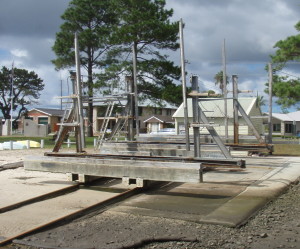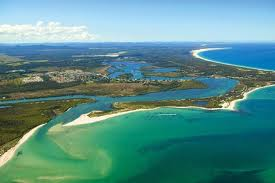Tea Gardens is a small holiday resort town located adjacent to the northern head of Port Stephens, 77 km north-east of Newcastle. It is situated near the mouth of the Myall River, providing boating access to the Myall Lakes and Port Stephens.
Tea Gardens has a history related to the Myall River and the many boats that have navigated its waters. Steam powered droghers originally plied the Myall River to bring timber from the Myall Lakes area to Port Stephens to be loaded aboard coastal ships for further shipment nationally and abroad. In its early years, Tea Gardens was home to many vessels exporting its produce to major areas of Newcastle and Sydney.
Fishing has always been a prime and important trade albeit for commercial markets or in more later years, recreational pastime. Additionally, tourism no doubt plays a role of some importance to Tea Gardens’ continued existence.
The area was occupied by the Worimi Aborigines prior to white settlement. The first Europeans to work in the area were timber-getters who took an interest in the forests (mostly red cedar) along the Myall River early in the 19th century. The timber was hauled by bullock train to mills, then carted by punt downriver. Ships bound for Newcastle and Sydney loaded the timber while unloading the stone they carried for ballast onto the banks of the river, much of it being used in the construction of the rock walls which can still be seen today.
The Australian Agricultural Company arrived in the area in 1826 and it was reputedly their failed attempts to grow tea which underscored the name Tea Gardens, although another account suggests it was the tea-tree in the area. Regardless, it is known that Chinese assistants were employed as advisors in the endeavour and they also acted as gardeners growing vegetables for the company settlements. Access to Hawks Nest near the mouth of the Myall River was by punt until a ferry service was established in 1928; this service ultimately being replaced by the “Singing” bridge in 1974.
 The town’s community slipway at Tea Gardens also has a long and involved history with the local area. The slipway was originally part of Birdwood Mill located at Winda Woppa near Hawks Nest. Once the Mill closed, ” falling victim to all that modernism and progress”, there was one thing that survived – the Tea Gardens slipway.
The town’s community slipway at Tea Gardens also has a long and involved history with the local area. The slipway was originally part of Birdwood Mill located at Winda Woppa near Hawks Nest. Once the Mill closed, ” falling victim to all that modernism and progress”, there was one thing that survived – the Tea Gardens slipway.
A number of far-sighted locals acquired her for a song, shortened the excess length and relocated that new look onto the waterfront of Tea Gardens, where today she is very much alive and working almost every day.
No longer are heavy droghers her one concern, now she has a lightweight clientele of smaller pleasure craft. No doubt this facility which has served the community in many ways for generations, will continue to do so well into the 21st century.
Integral to boaties and a maritime past, this 90 plus year old service facility has outlived many of her oldest customers. It still, today, attracts the interest of many locals and visitors alike, watching in awe as yet another local vessel is hauled out from the river for her annual bit of attention.
If the Tea Gardens Slipway was going to survive and continue to provide the services it has in the past, complying with today’s environmental legislation was recognised as being critical for the facility’s future. In 2015, the Slipway Association set about planning an upgrade never before undertaken at the slipway.
It was understood that the slipway had to be moved to higher ground and completely clear of the Myall River tidal zone. After years of trying to establish approvals for the new design, construction work finally began in March 2021 after securing the much needed funding for the project from Transport for NSW as part of the Boating Now maritime infrastructure improvement scheme.
The “new” slipway re-opened on 1 August 2021. All waste is collected and treated onsite to ensure nothing enters the waters of the Myall River.
A great community facility with an even greater historical past! Lets hope she will see the 22nd century and continue to serve this community well beyond all expectations.

